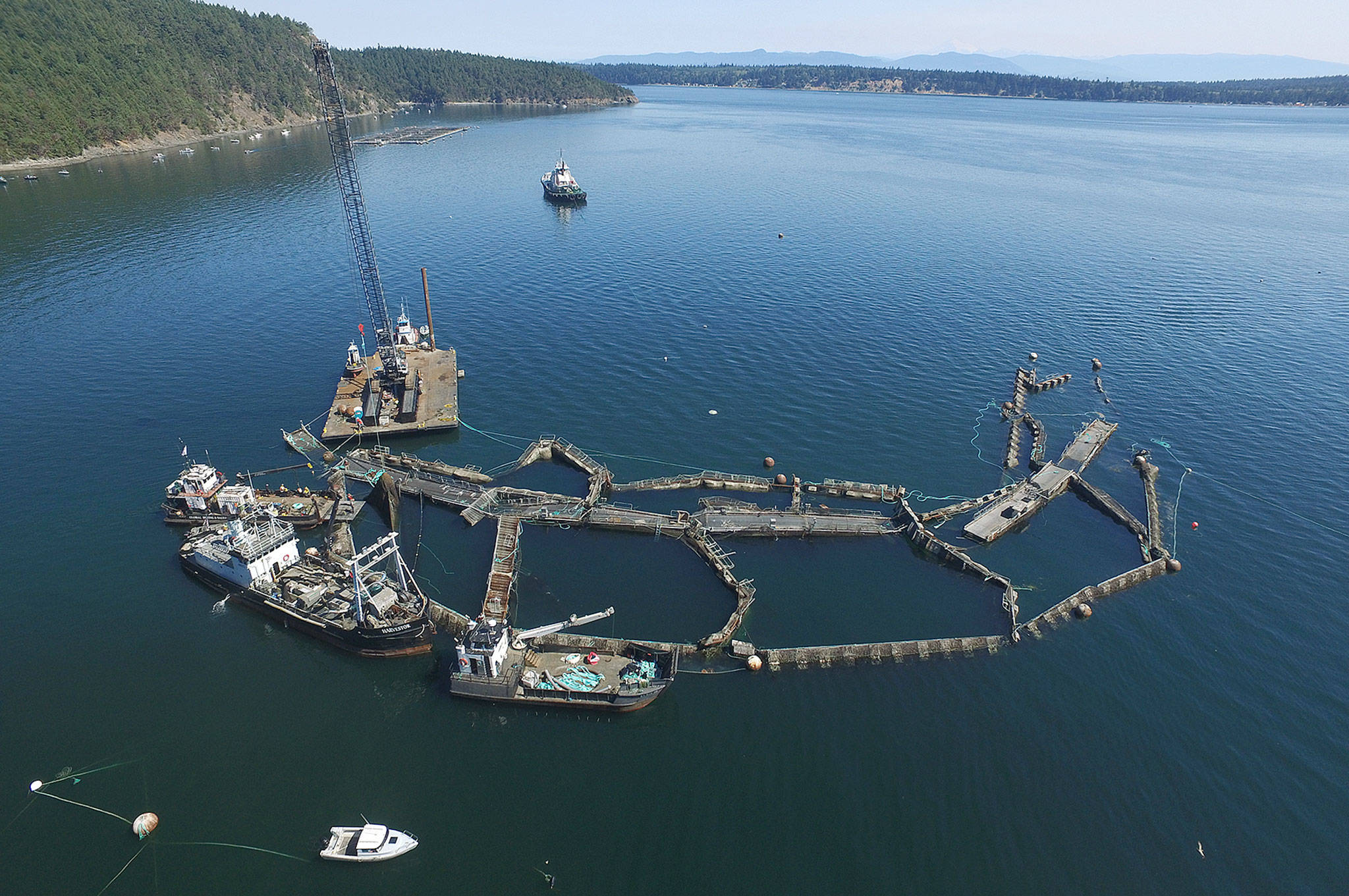PORT ANGELES — Cooke Aquaculture Pacific, which owns a waning fish farm off Ediz Hook, has agreed to pay a $332,000 fine for releasing 250,000 non-native fish that breached its compromised Cypress Island facility in August 2017, the state Department of Ecology has announced.
Ecology said Monday that the Canadian company had failed to maintain fish-farm nets and follow repair protocols at the site after one of the fish farm’s three net pens collapsed in Rosario Strait north of Anacortes.
Cooke Aquaculture Pacific did not want to relive “the regretful events of August 2017,” Cooke spokesman Joel Richardson said Monday in a statement the company issued in response to a query from Peninsula Daily News.
“When presented with the opportunity to dedicate 80 percent of the penalty ($265,600 USD) to a supplemental environmental project, Cooke made the decision to not litigate the penalty amount, and instead dedicate its resources to a project that will directly result in fisheries enhancement in the North Puget Sound region,” the statement said.
In a separate setback for Cooke on Friday, Duvall-based Wild Fish Conservancy won a partial summary judgment in a Western Federal District Court lawsuit alleging the company violated its federal Clean Water Act permit at eight facilities, including those at Cypress Island and in Port Angeles Harbor.
Federal District Court Judge John Coughenour ruled Friday that Cooke did not include annual inspection of its facilities’ main cage systems in its fish release prevention and monitoring plan.
A trial on the lawsuit, filed Nov. 13, 2017, is Dec. 2.
The state Department of Natural Resources had terminated the aquatic-lands lease Dec. 15, 2017, at Cooke’s Port Angeles Harbor fish farm, where Atlantic salmon can be farmed until June 30 to complete their life cycle, DNR spokesman Carlo Davis said Monday. The Cypress Island lease also was terminated.
Cooke, which has challenged the Port Angeles termination in Thurston County Superior Court, is being allowed to finish the fish-harvest life cycle, Davis said.
“My understanding is that it is pretty empty now, so they are just finishing getting all the fish out of there,” Davis said.
Cooke had addressed issues that led to DNR cutting short the lease, which had been set to expire in 2025.
DNR terminated the agreement after determining Cooke’s fish pens were 500 feet outside the authorized area.
DNR said Cooke also had an unsafe anchoring system and was polluting the harbor with Styrofoam.
A state ban on new fish farm permits and DNR lease renewals goes into effect in 2022, the beginning of the phase-out of fish farming in Washington state waters.
“There’s no official ‘ban date,’ the law just prohibits any new Atlantic salmon permits,” Carlo Davis, DNR spokesman, said Monday in an email.
“So existing leases (with existing permits) can continue, but can’t be extended/renewed.
“Cooke has leases up in 2020, so effectively those sites would be shut down at that point (for non-native salmon).”
Concerning the Wild Fish Conservancy lawsuit, Coughenour said there was “complete silence” in the company’s pollution prevention plan on the collection, storage and disposal of “harvest blood,” and that the company did not track the number of fish in its pens that were lost due to predation, mortality and escapement.
Coughenour did not address Wild Fish Conservancy’s request for relief including including attorney fees and $37,500 a day for each alleged violation before Nov. 2, 2015, and $52,414 per day after that date.
Kurt Beardslee, Wild Fish Conservancy executive director, said Coughenour’s ruling was instructive.
“It shows they were being negligent at every one of their facilities and did not have an adequate emergency response plan, which became most evident when we saw the collapse at Cypress,” he said Monday.
“That’s telling to the level of risk that we had allowed to be in Puget Sound.
“We have to make sure that doesn’t happen again.”
Cooke has applied to Ecology for federal permit renewals for four of its fish farms in Washington state waters despite a ban on new net pen permits that goes into effect in 2022, but the Port Angeles facility is not among the sites, Ecology spokeswoman Colleen Keltz said.
Ecology has oversight of permit compliance for the federal National Pollutant Discharge Elimination System permits that are up for renewal.
The Clean Water Act authorizes the Environmental Protection agency and the states to regulate sources of point-source pollutant discharges through the NPDES program.
As a result of the investigation into the Cypress Island incident, Ecology fined Cooke for water quality permit violations including poor net cleaning and maintenance, failure to follow required protocol for repairs, and “insufficient attention” to structural engineering, Ecology said in a press release.
Cooke appealed the penalty to the state Pollution Control Hearings Board, but in a legal settlement agreed to pay the full penalty.
Of the total settlement amount, $265,600 will pay for salmon enhancements or habitat restoration.
The remaining $66,400 will be paid into Ecology’s Coastal Protection Fund for environmental protection and restoration, Keltz said.
The Legislature determined in 2018 that farming non-native fish, such as Atlantic salmon, in Washington’s marine waters would be phased out starting in 2022.
Ecology is adding protective measures to water quality permits for Cooke’s four remaining floating fish pens near Hope Island and in Rich Passage near Bainbridge Island.
The upgrades include adding more underwater video monitoring of net pens, inspections to assess the net pens’ structural integrity, and improving net cleaning and maintenance to prevent fish from escaping.
________
Senior Staff Writer Paul Gottlieb can be reached at 360-452-2345, ext. 55650, or at pgottlieb@peninsuladailynews.com.

